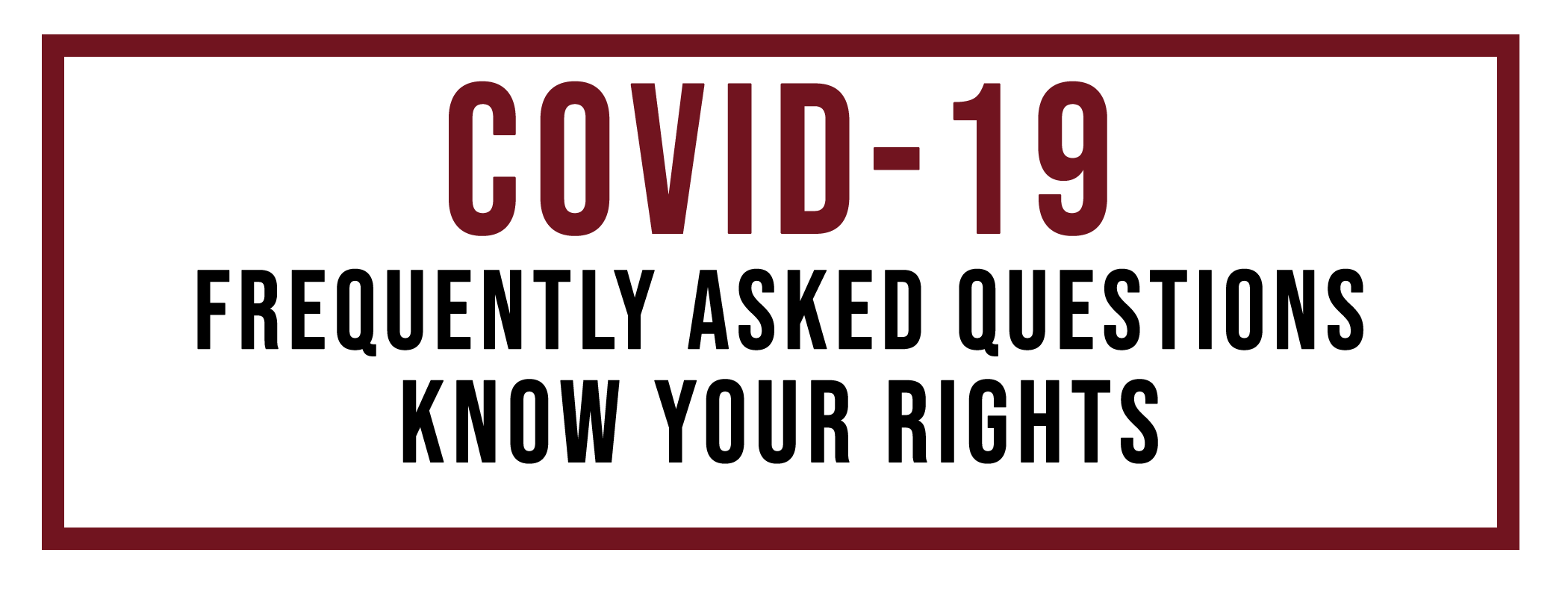Know Your Rights FAQ: COVID-19

Is my employer required to provide me with reasonable accommodations related to the Coronavirus?
Can my employer require me to submit to a medical screening for the coronavirus?
If I have coronavirus, what can my employer tell others about my condition?
What if I become sick at work with symptoms relating to coronavirus? Can my employer send me home?
If I need to be tested for the Coronavirus, will I have to pay a deductible or coinsurance?
I have more questions. Where can I get free, high-quality legal information about my rights?
(DISCLAIMER: This FAQ Sheet is intended to provide accurate, general background information regarding legal rights relating to employment in Maine. It is not legal advice. Because laws and legal procedures are subject to differing interpretations and frequent change, particularly in an emergency, the authors cannot ensure the information is current or be responsible for how the information is used. Do not rely on this information without consulting an attorney or the appropriate agency about your rights in your particular situation.)
-
Due to coronavirus (also known as COVID-19), my employer has cut my hours, forced me to take unpaid leave, or ended my employment. What can I do?
You may be eligible for unemployment benefits while you are out of work. In general, you may apply for unemployment benefits if you worked for an employer and made at least $5,150 during the last year.
The Maine Legislature just passed a law to expand unemployment benefits to workers affected by the COVID-19 virus. That legislation will be in effect during the State of Emergency called by the Governor, which will last at least until May 15, 2020 and may be extended. Under the new law, you can apply for unemployment insurance if:
- Your employer temporarily ceases operation due to COVID-19
- You are quarantined due to exposure to COVID-19 with the expectation of returning to work after the quarantine and you are not receiving paid sick leave from your employer
- You leave employment or take a temporary leave of absence due to the risk of exposure or infection from COVID-19
- You leave employment to care for a family member
You may also be eligible for partial unemployment insurance benefits if your hours are reduced but you remain employed.
During the emergency period (through May 15), the normal one-week waiting period for unemployment insurance benefits has been waived, so you will start receiving benefits immediately, and there is no work search requirement for employees who will be returning to the same job at the end of the crisis.
For more information, see these frequently asked questions from Maine Equal Justice.
For more information about Unemployment Insurance benefits, including eligibility requirements and how to file a claim, please visit https://www.maine.gov/unemployment/, review the Maine Unemployment Insurance Guide, or call 1-800-593-7660. The Department of Labor’s automated phone system offers help in English, French, and Spanish, and the Department will arrange for an interpreter for other languages.
-
I need to stay home from work because I have coronavirus/I have been advised or ordered to self-quarantine. What can I do to receive income while I am not working?
Under the recently passed Families First Coronavirus Response Act (the Families First Act), which goes into effect no later than April 2, 2020 and expires December 31, 2020, any government employer or employer with fewer than 500 employees is required to immediately provide 10 days of emergency paid sick leave to its employees. Employers with fewer than 50 employees may be able to obtain a waiver from the Department of Labor relieving them from having to provide sick leave under the Act, and employers of employees who are healthcare providers or emergency responders may be able to opt out of the law.
If the Families First Act applies to your employer and you are a full-time employee, you are entitled to 80 hours of leave. If you are a part-time employee, you are entitled to the average number of hours you work in a two-week period. You are eligible for this paid sick leave if you are unable to work and:
- You are complying with a recommendation from a healthcare provider to self-quarantine or self-isolate
- You are complying with a federal, state, or local quarantine or isolation order
- You are seeking a diagnosis or care for coronavirus symptoms
- You are caring for an individual who quarantined or self-isolated due to a healthcare provider recommendation or government order
- You are caring for a child whose school or place of care has been closed or childcare provider is unavailable due to coronavirus.
During your sick leave, your employer is required to pay you 100% of your regular pay, but capped at:
- $511 per day ($5,110 in the aggregate) when you are caring for yourself
- $200 per day ($2,000 in the aggregate) when you are caring for others
If you are unable to do your usual job because you contracted coronavirus during the regular course of your work, you may be eligible for workers’ compensation benefits, including temporary disability payments and medical treatment. The Southern Maine Workers’ Center’s WORK Manual provides a basic overview of the Maine workers’ comp system and key workers’ comp deadlines at page 62. Importantly, you need to tell your employer that you were injured within 60 days of the injury in order to make a workers’ compensation claim. More information about what to do and how to file a claim can be found on the Workers’ Compensation Board website here.
-
A close family member of mine has coronavirus, and I will stay home from work to take care of them. What can I do to receive income while I’m not working?
As described in FAQ 2 above, under the Families First Act, government employers and employers with fewer than 500 employees are required to provide their employees with 10 days of sick leave, which can be used to care for someone with coronavirus or who has been advised by a healthcare professional to self-quarantine because of concerns about the virus. Employers with fewer than 50 employees may be able to obtain a waiver from the Department of Labor relieving them from having to provide sick leave under the Act, and employers of employees who are healthcare providers or emergency responders may be able to opt out of the law.
If you are not eligible for sick leave and you leave your job to care for a family member, you may be eligible for unemployment benefits (see FAQ 1). You may also be entitled to take job-protected unpaid leave under the Family and Medical Leave Act (FMLA) or the Maine Family Leave Requirements Act (see FAQ 5).
-
My child’s daycare or school is closed because of the coronavirus threat. Can I take time off to care for my child?
In addition to the 10 days of paid sick leave described in FAQ 2, your employer may be required to allow you to take 12 weeks of paid, job-protected leave to care for your child while your child is out of school or daycare is unavailable. After at least 10 days of leave (during which you are permitted to use other types of paid leave provided by your employer, including the sick leave described in FAQ 2), your employer must pay you ⅔ of your regular rate of pay up to a cap of $200 per day or $10,000 total.
The law applies if: (1) you are an employee of the Federal Government or your employer has fewer than 500 employees; and (2) you have been employed for 30 calendar days. However, employers with fewer than 50 employees may be able to obtain a waiver from the Department of Labor relieving them from having to provide leave under the Act, and employers of employees who are healthcare providers or emergency responders can opt out of the law.
-
Can I lose my job if I need to take time off because I am sick with coronavirus or my family member is sick with coronavirus?
As described in FAQ 9, Coronavirus may be a disability within the meaning of the Americans with Disabilities Act (ADA) and the Maine Human Rights Act (MHRA). If so, it would be illegal for your employer to fire you because you develop Coronavirus, because it regards you as having coronavirus, or because you associate with someone who has Coronavirus. Additionally, as described in FAQ 7, if you have coronavirus, your employer may need to provide you with accommodations, including leave.
In addition to the paid leave described above, you may also be entitled to job-protected unpaid leave to care for your own medical condition or the medical condition of a family member. Importantly, this job-protected leave does apply to employers with more than 500 employees.
You likely qualify for up to 12 weeks of leave per each calendar year under the federal FMLA if all of the following statements apply to you:
- You work for an employer with at least 50 employees within 75 miles of your worksite;
- You have worked there for at least a year, and
- You worked at least 1250 hours in the year before you take time off.
If you do not qualify for leave under the federal FMLA, you likely qualify for up to 10 weeks of leave per two calendar years under the state FMLA if both of the following statements apply to you:
- You work for an employer with at least 15 employees at your work site; and
- You have worked there for at least a year.
-
Because of coronavirus, my employer made assumptions about me or treated me differently than coworkers because I am Asian or from another country. What can I do?
An employer who treats you worse than other workers because of your race, national origin, or ethnic background is violating the law. This includes employer actions that single you out because of negative stereotypes. Please see pages 19 and 21 of the Southern Maine Workers’ Center’s WORK Manual for more information on race or national origin discrimination claims.
If you believe you have been discriminated against, contact an employment discrimination attorney. You may also contact the Maine Human Rights Commission directly by filling out an online intake form or calling (207) 624-6290. Keep in mind that short deadlines may apply to your claims, including a 300-day deadline for filing a complaint with the Maine Human Rights Commission and a 45-day deadline for federal employees to initiate a complaint with their EEO counselor.
-
Is my employer required to provide me with reasonable accommodations related to the Coronavirus?
If you have a compromised immune system or another medical condition impacted by the coronavirus (including mental health conditions like anxiety disorders), your employer may be required to provide you with a reasonable accommodation like telecommuting or protective equipment, unless doing so would cause the employer an undue hardship.
Having common cold or seasonal flu symptoms are usually not considered a disability and will not be entitled to accommodations. However, coronavirus might be considered a disability. If you have coronavirus, particularly if your symptoms are severe, your employer may be required to explore changes that allow you to continue your job or take time off from work.
Your employer is required to keep confidential any information that you disclose during the reasonable accommodation process.
For more information about the definition of a disability and requesting a reasonable accommodation, please see this resource from Disability Rights Maine, or refer to page 25 of the WORK Manual.
-
Can my employer terminate me or discipline me for refusing to work in an environment in which there is a high risk of exposure to coronavirus, if I report a risk of exposure, or if I advocate for changes to make my workplace safer?
Under the Maine Whistleblowers’ Protection Act (MWPA), your employer cannot discriminate against you for your good faith report of what you have “reasonable cause to believe is a condition or practice that would put at risk the health or safety of that employee or any other individual.” Therefore, a report you make about a risk of exposure may qualify as protected activity under the MWPA and your employer may be liable for retaliating against you by terminating you or disciplining you for making such a report.
Additionally, the MWPA protects you from discrimination for your good faith refusal to carry out a directive to engage in activity that would expose you “to a condition that would result in serious injury or death.” That may include refusing to come to your worksite if there is a high risk of exposure to the virus. However, you are only protected if you first report the condition to your employer.
The WORK Manual has information about whistleblower retaliation at page 72.
If you believe that you have been subject to retaliation under the MWPA, contact an employment discrimination attorney. You may also file a complaint with the Maine Human Rights Commission directly by filling out an online intake form or calling (207) 624-6290. Keep in mind that short deadlines may apply to your claims, including a 300-day deadline for filing a complaint with the Maine Human Rights Commission.
You and your fellow workers may also be protected by Section 502 of the National Labor Relations Act (NLRA) for refusing to work in an unsafe workplace. The protections of the NLRA apply regardless of whether your workplace is unionized.
-
Can my employer fire me because I have coronavirus, they suspect I have coronavirus, or someone in my household has coronavirus?
It is illegal for your employer to fire you or otherwise treat you worse than other employees because you have a disability or are regarded as having a disability. Because COVID-19 may be a disability, it may be illegal for your employer to fire you because you have it or because your employer regards you as having it, particularly where accommodations like unpaid leave are available to address any safety concerns the employer has. Additionally, it is illegal for an employer to fire someone or treat someone worse because of their association with someone with a disability, which may include your association with someone who has coronavirus.
If you believe you have been subject to discrimination because of a disability, contact an employment discrimination attorney. You may also file a complaint with the Maine Human Rights Commission directly by filling out an online intake form or calling (207) 624-6290. Keep in mind that short deadlines may apply to your claims, including a 300-day deadline for filing a complaint with the Maine Human Rights Commission and a 45-day deadline for federal employees to initiate a complaint with their EEO counselor.
-
The CDC has said that individuals age 60 and older are more vulnerable to the Coronavirus. My employer decided to send everyone older than 60 home without pay to protect them. Is that legal?
Treating older workers less favorably than other employees, even if well-intentioned, can violate the Age Discrimination in Employment Act (ADEA) and the MHRA.
If you believe you have been discriminated against on the basis of your age, contact an employment discrimination attorney. You may also file a complaint with the Maine Human Rights Commission directly by filling out an online intake form or calling (207) 624-6290. Keep in mind that short deadlines may apply to your claims, including a 300-day deadline for filing a complaint with the Maine Human Rights Commission and a 45-day deadline for federal employees to initiate a complaint with their EEO counselor.
-
Can my employer require me to submit to a medical screening for the coronavirus?
The Families First Act allows employers to require employees entering the workplace to have their temperature taken. It also allows employers to ask employees about whether they have any symptoms associated with the coronavirus.
-
Can my employer ask me if I have a health condition (like a compromised immune system) that would be affected by coronavirus?
No. It would be against the law for an employer to ask an employee without symptoms of coronavirus if they have a medical condition that would make them particularly vulnerable.
-
If I traveled to a country affected by coronavirus, can my employer ask me if I was exposed to coronavirus or require me to stay home during the incubation period?
Yes, the Centers for Disease Control (CDC) has recommended that travelers to certain countries stay home for 14 days. The list of countries may change; refer to the CDC website for further information.
-
If I have coronavirus, what can my employer tell others about my condition?
Your employer is required by law to keep all medical information about you private and confidential. It can, however, share your medical information with those who have a “need to know.”
-
What if I become sick at work with symptoms relating to coronavirus? Can my employer send me home?
Yes. The CDC recommends that employees who become sick with coronavirus symptoms (such as fever, cough, shortness of breath, or fatigue) should be separated from other employees and sent home immediately.
-
Can my employer not pay me if I am sent home early from work, or told not to come in for a scheduled shift?
Unfortunately, under Maine law, employers are only required to pay employees for hours actually worked, so if you are an hourly employee and are sent home early, you need only be paid for the time you worked. Maine law does not require employers to pay employees for reporting or showing up to work if no work is performed. An employer is also not required to pay an employee a minimum number of hours if an employer tells an employee not to come in for a scheduled shift.
-
If I need to be tested for the Coronavirus, will I have to pay a deductible or coinsurance?
No. The Families First Act requires group health plans and insurers, including self-insurers, Medicare, Medicaid, and other federal health programs, to pay the full cost of any tests for the Coronavirus.
-
I have more questions. Where can I get free, high-quality legal information about my rights?
Free legal resources. For free legal advice from experienced lawyers in Maine, you can go online to Free Legal Answers, which is an online legal clinic for people who have lower incomes. Go to maine.freelegalanswers.org and fill out a brief eligibility survey, and provide your email. Write in your questions with some context for the lawyer; you can upload documents, and ask follow up questions. You will need to provide information about you and your employer, but this is kept confidential. When a volunteer lawyer answers your question, you will be notified by email.
If you are denied unemployment benefits, or are interested in asking about a referral for legal representation please email the Volunteer Lawyers Project at intake@vlp.org or call 1-800-442-4293 on Mondays from 1-3:30pm. Interpretation is available by phone. If leaving an email, please leave your name, legal question, and a good phone number for an intake interviewer to return your call.
The Southern Maine Workers’ Center is a member-led organization building a movement to improve the lives, working conditions, and terms of employment for working class and poor people in Maine. Our Worker Support Hotline can help workers understand their legal rights and provide support for workers who want to organize.
Hotline phone: (207) 888-1010
Hotline email: workersupport@maineworkers.org
Website: www.maineworkers.org
Office phone: 207-200-7692
General email: info@maineworkers.org
Johnson, Webbert & Young has been a leader in employment, labor, civil rights, aviation, and ethics law for over 25 years. The firm focuses on complex and important cases, including class actions, employment discrimination and harassment, wage and hour, professional licensing, malpractice, and serious personal injury claims. If you believe you have been a victim of illegal discrimination or other unfair practices by your employer, call (207) 623-5110 or fill out the online contact form at www.johnsonwebbert.com.
Hiring a lawyer. The Maine State Bar Association runs a referral service that can help you find a qualified attorney, which you can reach at 1-800-860-1460. There is a $25 charge for a half-hour consultation. For discrimination cases, the Maine Human Rights Commission maintains an online list of employment attorneys. You may also be able to find an attorney in the yellow pages or online by searching for lawyers who specialize in “employment law” or “worker’s rights,” or one of the specialized areas of law discussed above.
Retaining an attorney. Whether or not a lawyer will take your case will often depend on the strength of your claims and how difficult it will be to prove them. One reason for this is that many employment attorneys work on what is called a “contingent fee” agreement. Under this type of an agreement, an attorney is paid a percentage of (usually 33% or 40%) of any settlement or award from a successful claim. If the claim is not successful, the attorney will not be paid anything. An attorney that works under this business model is likely to decide whether to take your case by balancing the risks of losing against the potential to win money damages. Sometimes, attorneys are able to take cases that involve even relatively low damages if the claims are strong enough, because the law often requires an employer to pay your lawyer for time spent on your case if you win.
This information has been brought to you by the following partners


